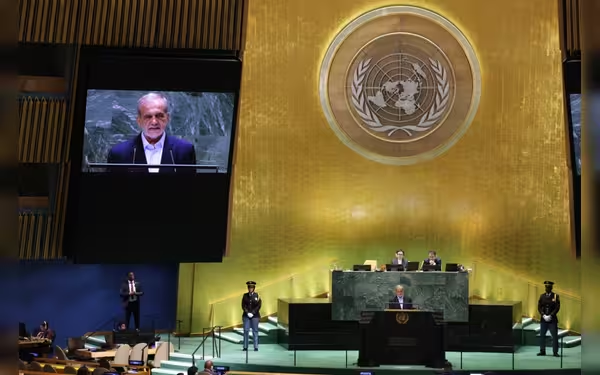Saturday, November 16, 2024 07:33 PM
Iran's Strategic Response to Haniyeh's Assassination Amid Regional Tensions
- Haniyeh's assassination escalates Israel-Iran tensions.
- Iran's new president advocates for diplomatic engagement.
- Pezeshkian condemns Israel's actions in Gaza and Lebanon.
 Image Credits: arabnewspk
Image Credits: arabnewspkIran's new president calls for dialogue after Haniyeh's assassination, emphasizing restraint amid escalating regional tensions.
In recent weeks, the geopolitical landscape of the Middle East has been shaken by a series of events that have drawn international attention. The assassination of Ismail Haniyeh, the head of Hamas’ Political Bureau, in Tehran on July 31, has raised eyebrows and questions about the intentions of the Israeli government. Haniyeh was a key figure in negotiations for a ceasefire with Israel, making his killing a significant and provocative act. Israeli Prime Minister Benjamin Netanyahu, facing criticism for his approach to conflict, appears to be using this incident to escalate tensions further, potentially dragging Iran into a broader regional conflict.
The timing and location of Haniyeh's assassination were not coincidental. He was in Tehran for the inauguration of Iran’s new president, Masoud Pezeshkian, who is viewed as a moderate leader. Pezeshkian's election, supported by Supreme Leader Ayatollah Ali Khamenei, suggests a possible shift in Iran's foreign policy towards a more conciliatory approach. This is particularly relevant as Pezeshkian expressed a desire to normalize relations with the world, a sentiment echoed during his inauguration speech.
Despite the ongoing violence in Gaza and Lebanon, Iran has shown remarkable restraint. Pezeshkian, during a press conference at the United Nations, emphasized that Iran does not wish to instigate instability in the region. He stated, "What Israel has done in the region and what Israel tried with the assassination of Ismail Haniyeh in Iran was to drag us into a regional war." This statement highlights Iran's cautious approach, even in the face of provocations.
Moreover, Pezeshkian's address to the UN General Assembly condemned Israel's actions in Gaza, where thousands of innocent lives have been lost. He called for an end to Israel's "desperate barbarism" in Lebanon, warning that such actions could have dire consequences for the entire region. His message was clear: Iran is ready to engage in constructive dialogue and seeks to play a positive role in the evolving global order.
Experts are divided on whether Iran is genuinely pursuing a new path under Pezeshkian's leadership. While some believe that the new president and foreign minister, Abbas Araghchi, are seeking to ease tensions and negotiate with the West, others argue that they lack the authority to implement significant changes in Iran's policies. The reality is that any progress towards reducing tensions could strengthen reformist factions within Iran, potentially leading to a more stable and cooperative regional environment.
As the situation unfolds, the world watches closely. The delicate balance of power in the Middle East hangs in the balance, and the actions of Iran, Israel, and their respective allies will shape the future of the region. The hope remains that diplomatic efforts will prevail over military confrontations, allowing for a more peaceful coexistence among nations. In a world where conflict often overshadows cooperation, the potential for dialogue and understanding is a beacon of hope for a better tomorrow.













